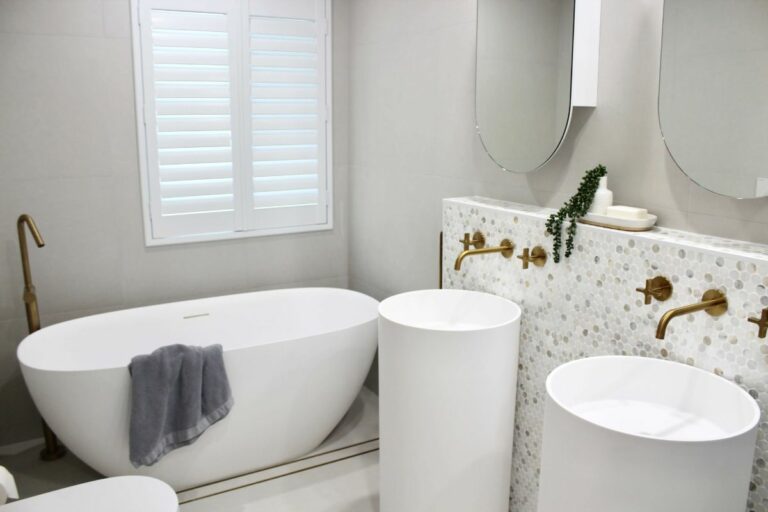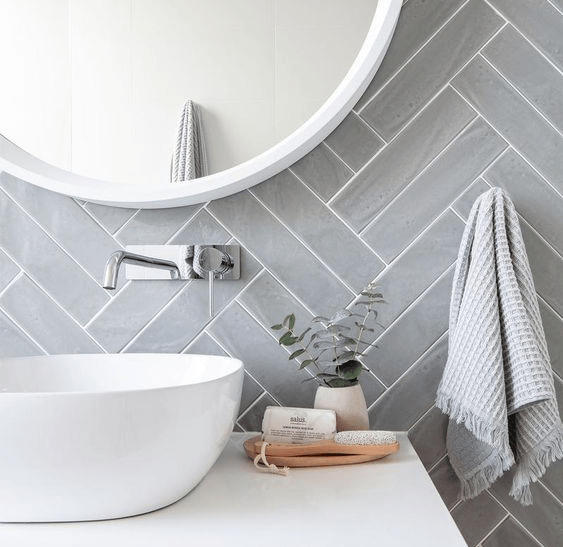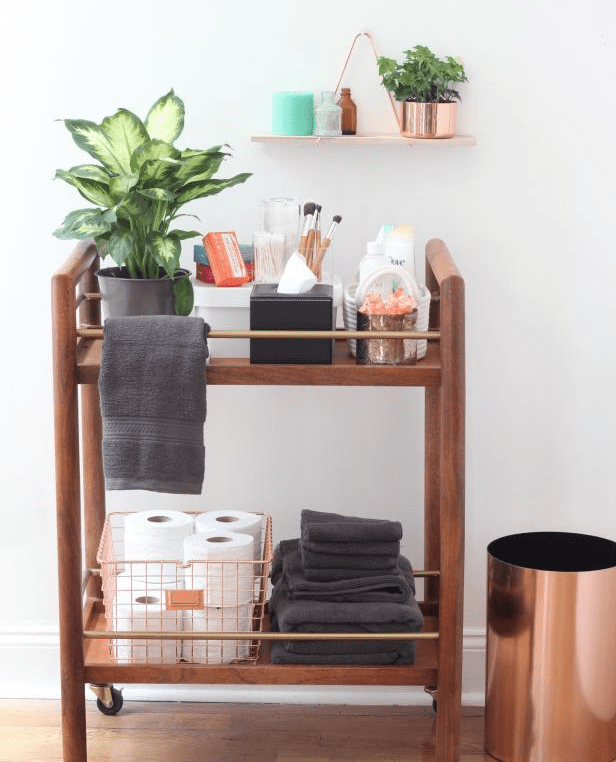Bathroom renovations
Essential Tips for Planning Bathroom Renovations
Starting Your Bathroom Renovation Process
Planning a bathroom renovation can be an exciting and daunting venture. Good planning will turn your bathroom from ordinary to extraordinary. This guide will help you budget for renovations and create a bathroom you love.
The first step is to decide the purpose of your remodel. Some homeowners want to update an outdated space. Others want a more functional space, while others want to create a luxurious retreat.
Look at your bathroom’s current condition and decide on your goal. Soon you will be ready to create a wishlist to meet your renovation needs.
Establishing a Budget for Bathroom Renovations
A realistic budget helps you make decisions about materials, fixtures, and labour costs. The renovation budget will vary depending on the project’s size and scope. For a significant project, Refresh Renovations shows costs of $16,000 – $30,000. A top-end luxurious bathroom will cost around $70,000.
Potential expenses to consider include:
- Material costs: tiles, fixtures, bathroom furniture
- Labour costs: plumbers, electricians, tiling professionals
- Council fees: if the layout or structural changes occur.
- Contingency funds: add a 30% cushion to the initial budget estimate.
When you have set a target budget, create a list of ‘must haves’ and ‘nice to haves’. A contingency plan will allow you to adjust to stay within your budget.
Flexibility is the key to a successful and cost-effective bathroom renovation project.
Bathroom Layouts
Space Management
You must measure the room and create a scale drawing on graph paper. This helps make the most of your available space.
Here are a few tips for effective space management:
- Position the toilet, sink, and shower or bath to maximise available space
- Wall-hung vanities or vertical storage will help save space
- A corner shower or sink will reduce the amount of wall and floor space used

Selecting Fixtures and Fittings
The correct fixtures and fittings will allow you to make the most of your available space.
Freestanding Baths and Showers
When selecting a bath or shower consider available space, preferred style, and budget.
There are various baths, such as freestanding, built-in, and whirlpool. Walk-in showers are popular. Add a beautiful shower screen to complement your bathroom renovation.
You want your bathroom to work for you, so consider the aesthetics and budget.
Some factors to consider include:
- Freestanding bathtubs are standalone and can add a luxurious touch
- Built-in bathtubs need less space but may have less aesthetic appeal
- Whirlpool baths offer a spa-like experience with water jets
- Showers are curbed or a curbless walk-in shower
- Rain shower heads are important budget-saving items

Toilets
Toilets come in different styles. You can have close-coupled, wall-hung, and back-to-wall. Each has its own set of features and aesthetics to complement your bathroom design. Choose a toilet with a higher water efficiency rating to reduce water consumption.
- Close-coupled toilets have a cistern attached to the bowl
- Wall-hung toilets mount to the wall with the cistern hidden
- Back-to-wall toilets have a cistern concealed within a wall or furniture unit
Sink and Bathroom Vanity
There are pedestal sinks, wall-mounted sinks, and vanity units with integrated sinks. Consider the room’s daily patterns of usage and storage requirements. Choose a sink that blends with your design:
- Pedestal sinks are ideal for small bathrooms with limited space
- Wall-mounted sinks can be at various heights and offer a streamlined appearance
- Vanity units with integrated sinks give ample storage and counter space
- A mirrored cabinet can create a feeling of more room in smaller bathrooms
Considering Environmental Impact
Energy Efficiency
LED lights are more energy efficient than traditional incandescent or halogen bulbs. Electric towel rails and underfloor heating can be useful too. Motion sensor lighting automatically switches off lights and fans. Also consider solar, gas and heat pump hot water to reduce costs.
Water Conservation
There are several ways to reduce water usage in your bathroom. Low-flow showerheads and faucets can help decrease water consumption. This saves energy and lowers your water bills. Some other measures include:
- Using a dual flush toilet system saves water
- A water-efficient tap aerator, reduces water flow by up to 50%
- Opt for a thermostatic mixing valve to regulate your shower water temperature to reduce excessive hot water usage
How to Build an Environmentally Sustainable Bathroom has some great ideas for creating an eco-friendly bathroom.
Using water conservation features can prevent 18 litres of water a minute wastage. This can save up to $150 on your water bill.
Choosing Materials for Durability and Style
Bathroom tiles play an important functional and aesthetic role in your own bathroom design. They can draw your eye through the texture and style.
Flooring
Floor tiles should be slip-resistant, waterproof, and durable. Some popular options include:
- Porcelain and ceramic tiles come in various finishes. They are low maintenance and water-resistant. Drury Designs useful guide will help you here.
- Natural stone tiles such as granite, marble, or slate gives a more luxurious and sophisticated feel. Regular sealing to prevent staining and damage.
- Vinyl flooring is durable and cost effective. Vinyl floors can mimic natural materials like wood and stone. They are easy to clean and resistant to water, mould, and mildew.
Wall Tiles
It’s exciting to choose your tile colour! Remember wall tiles should be water-resistant and easy to clean. Some common options are:- Ceramic and porcelain tiles are versatile and durable. They are available in a range of sizes, shapes, colours, and finishes. They can create various patterns and designs. They can add texture and visual interest to bathroom walls.
- Glass tiles are non-porous. They are resistant to mould and mildew, and add a touch of modern elegance to your bathroom. They come in various colours and finishes, from translucent to opaque.
- Natural stone tiles such as granite or marble, create a spa-like ambiance. Remember they need more maintenance than other options.

Countertops
The countertop will be one of the most noticeable elements in your bathroom. Choosing a material combines durability with visual appeal. Consider the following options:
- Granite, marble, or quartzite are sturdy and elegant. These natural stones are a popular choice for bathroom countertops. They need minimal maintenance and can withstand daily wear and tear well. Granite and quartzite offer a subtle yet sophisticated look. Marble adds a touch of luxury
- Recycled glass is an eco-friendly option. It comes in various colours and can be made to match your bathroom style.
- Soapstone and zinc are good materials if you are looking for a unique and stylish countertop. Soapstone has a soft, matte finish. Zinc develops a unique patina over time, lending an industrial look.
You will need to balance durability, style and budget factors when choosing the most suitable materials for your project.
Storage Solutions and Organisation
- Use drawer dividers for sorting smaller items like makeup, razors, and toothbrushes
- Install hooks and towel racks for hanging towels, bathrobes, and other items to keep them off the floor
- Use baskets and bins for organising items on open shelves preventing clutter
- Install a lazy Susan for easy access to items stored in deep cabinets or on high shelves

Lighting Options
Choosing the right lighting options creates a functional and visually appealing space for your bathroom reno.
Task Lighting
Task lighting is vital for activities such as applying makeup, shaving, or fixing your hair. Placing sconces at eye level on each side of the mirror can prevent shadows. Use mirror lighting, illuminated cabinets or shelves to increase visibility.
Ambient Lighting
Ambient lighting gives general illumination throughout the bathroom. Ceiling mounted fixtures such as downlights or flush mounts are useful. A dimmable fixture for adjustable brightness is also handy. For more ideas check out this Definitive Guide to Bathroom Lighting.
Accent Lighting
Accent lighting can transform the look and feel of the space. It can highlight specific features such as artwork, decorative tiles, or architectural elements. It can also create a warm and inviting atmosphere by adding layers of light and depth to the room.
- Experiment with different lighting styles and placements
- Choose energy-efficient and water-resistant lighting options
- Ensure accent lighting complements the bathroom’s design and colour scheme
Hiring Professionals vs DIY
When planning your project, you must decide whether to hire professionals or do it yourself (DIY). In Bathroom Renovation: DIY or Tradie you will find plenty you can do in a bathroom renovation to save money without compromising safety standards. It’s very important to know your limitations and the legal requirements of your renovation.
Hiring professionals can provide a stress-free experience. You can rely on their expertise to manage the project from beginning to end. From design to executing the renovation, a professional will handle the important aspects of the project. They will ensure quality workmanship and adherence to building codes. If you are unsure where to start, Refresh Renovations has a good checklist.
A bathroom remodel done by a professional can be quite costly. It will involve different licensed tradespeople. A DIY renovation offers the potential for significant savings. Labour fees make up 20% to 40% of professional installation costs. The Bathroom Renovation Pricing Guide gives a handy breakdown of costs for your bathroom reno.
Here’s a brief comparison of the two options:
Hiring Professionals
- Stress-free experience
- Expertise in project management and design
- Assurance of quality workmanship
- Compliance with building and licensing codes
- Potentially high costs
DIY Approach
- Potential for significant cost savings
- Greater control over design and materials
- Flexible timeline
- Possible errors and setbacks
- Possible need for extra tools or expertise
Always consider the extent of the renovation, your skill level, time availability and budget when making this important decision.
Key Takeaways
- Planning your bathroom renovation involves defining its purpose, setting a realistic budget, and choosing materials that balance durability, style, and budget.
- Effective space management and considering accessibility standards are crucial for a functional design.
- Selection of fixtures, fittings, and tiles should consider aesthetics, water and energy efficiency, and the environmental impact.
- Organisational solutions and the right lighting can significantly enhance both the functionality and ambiance of the bathroom.
- Deciding between hiring professionals or taking a DIY approach depends on your skills, budget, and the project's complexity.
Ready to Renovate Your Bathroom? Contact Hunter Bathroom Renovations
Renovating a bathroom involves several steps, including planning, demolition, plumbing and electrical work, installing new fixtures and finishes, and final cleanup. It’s essential to set a budget and hire experienced professionals if needed to ensure all design elements are included, such as lighting, storage, and accessibility.
Careful bathroom planning will ensure your dream bathroom project will be an outstanding success – talk to the professionals at Hunter Bathroom Renovations for more information.
Share
Jarrod Adnum
Jarrod Adnum is the founder of Hunter Bathroom Renovations. He is proud to lead an experienced team and support staff that are experts in their field. All staff ensure you are getting the best solutions and service for your bathroom.

